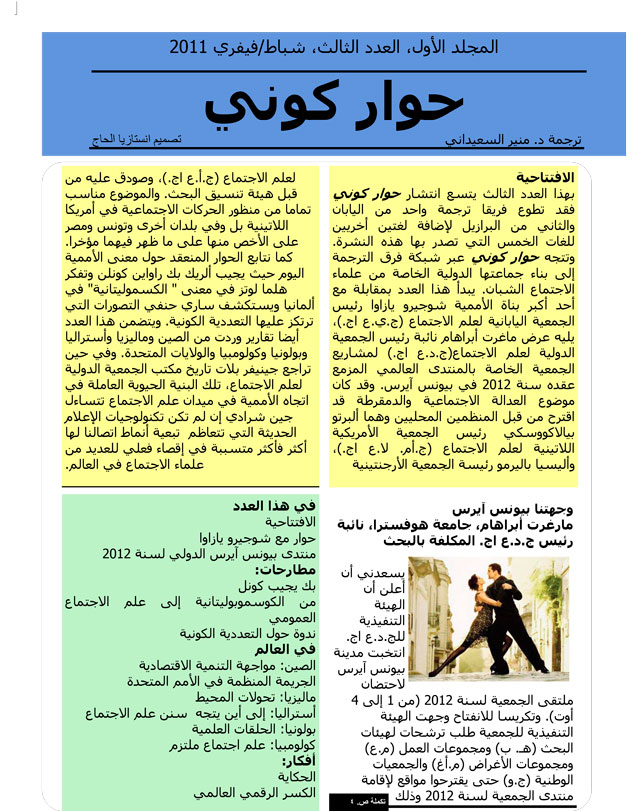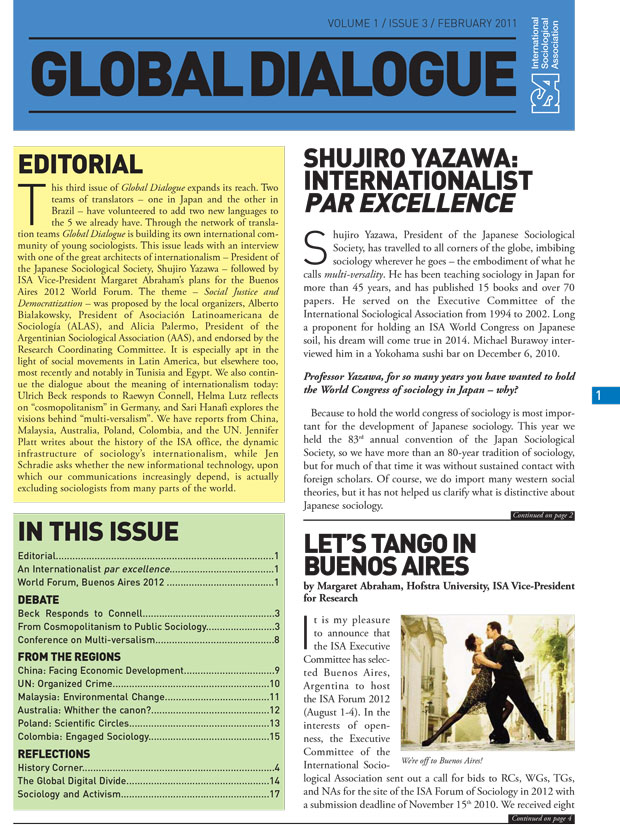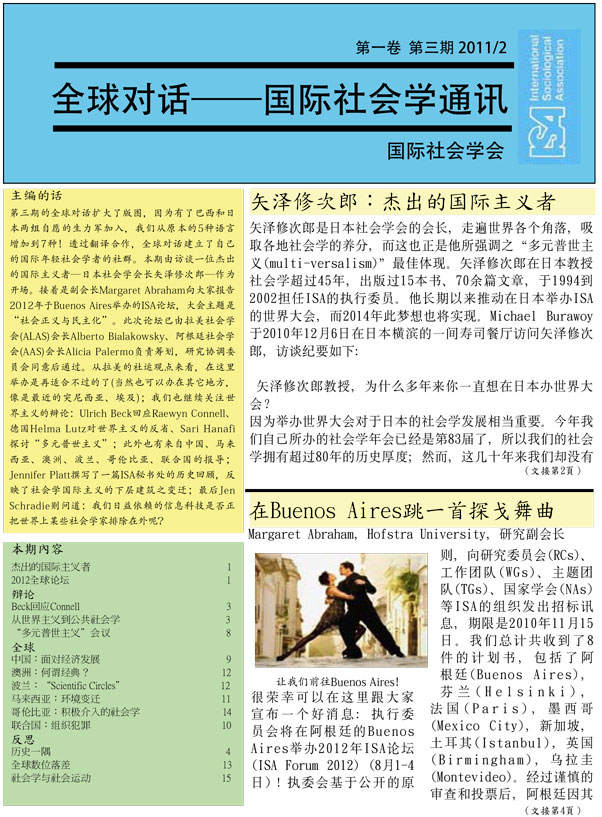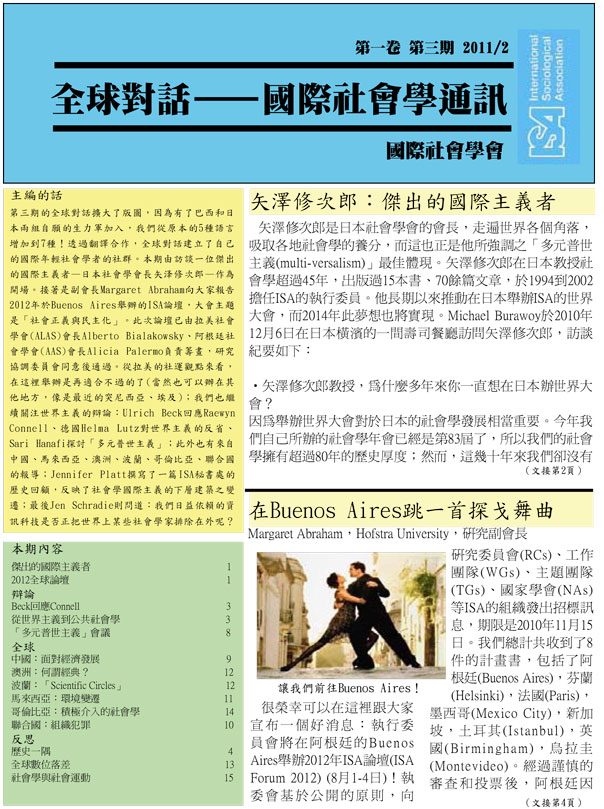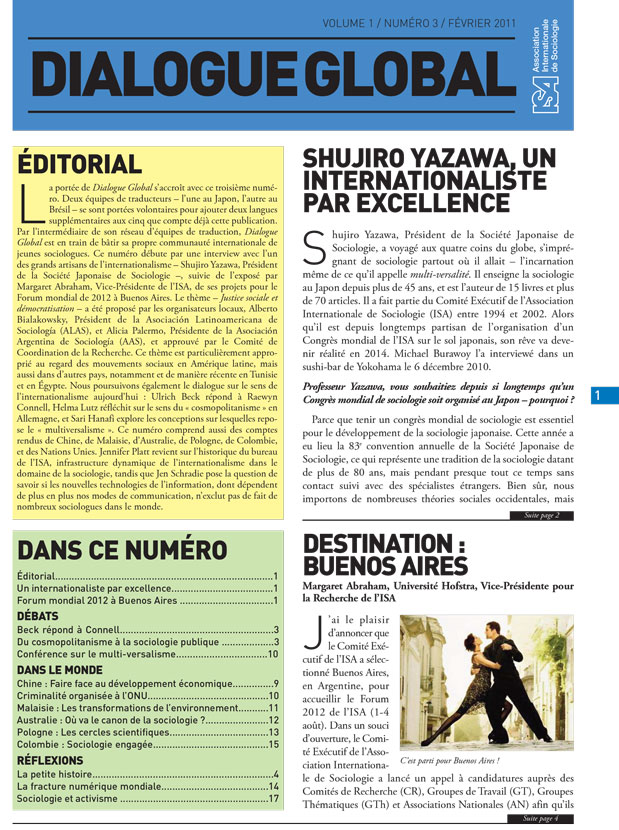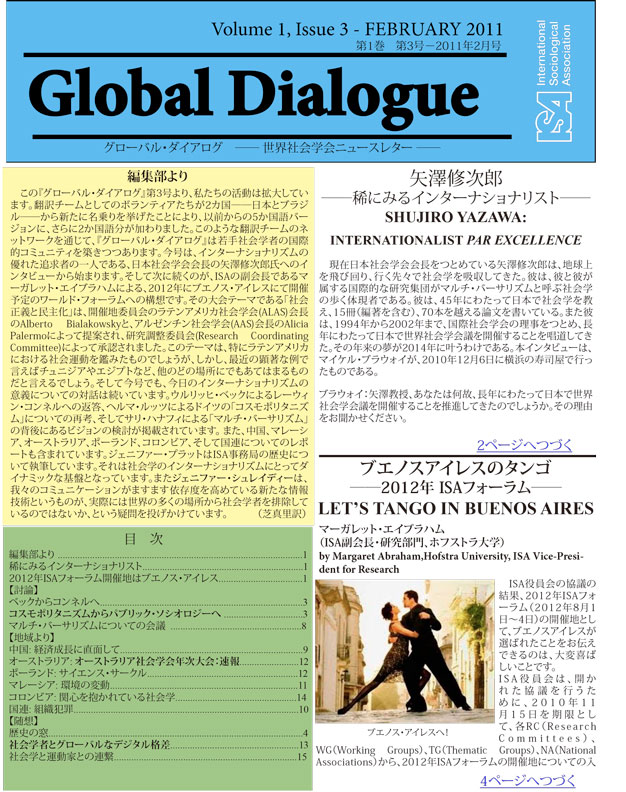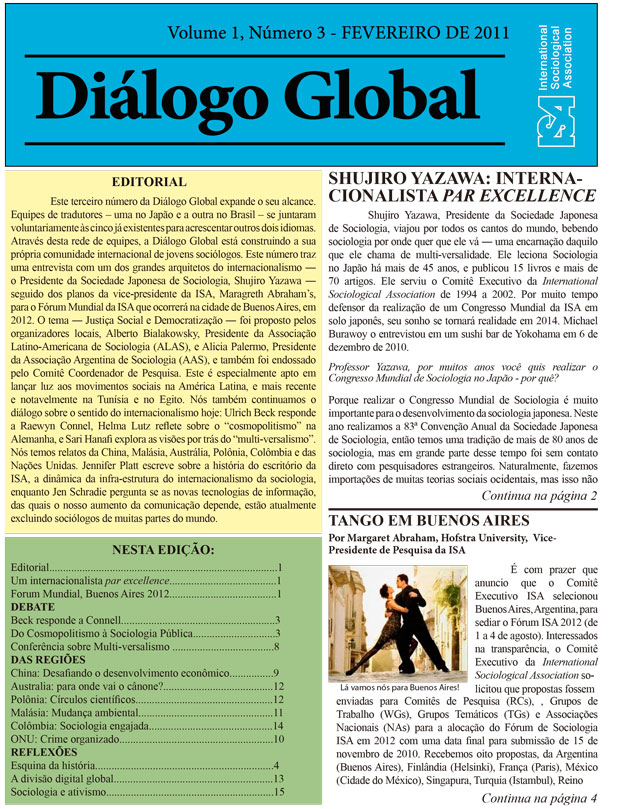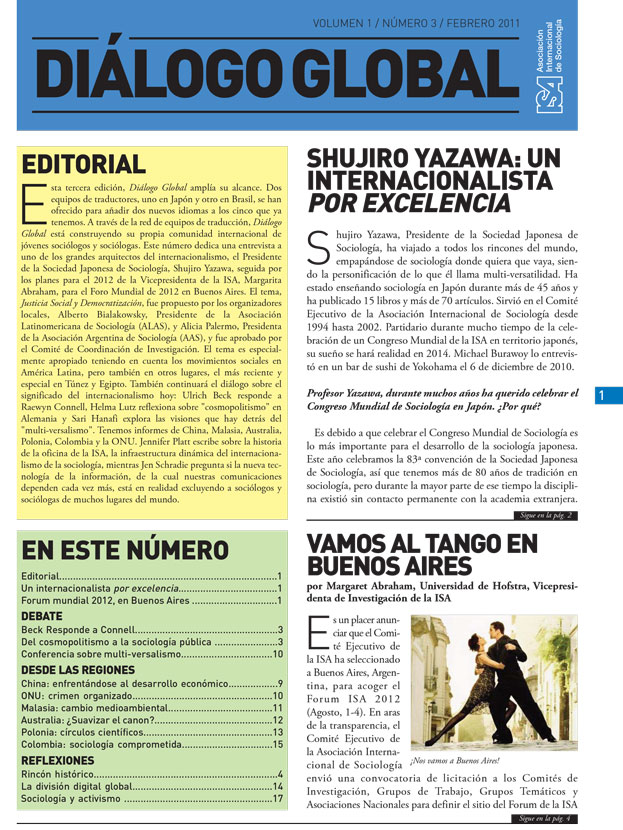Read more about Debate on Internationalism
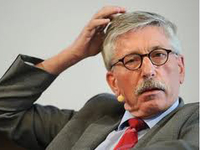
From Cosmopolitanism to Public Sociology
by Helma Lutz

Fresh Kidneys: What Does Cosmopolitan Theory Have to Say to Southern Sociology?
by Ulrich Beck
February 16, 2011
The newly established “World Social Sciences and Humanities Network” (World SSH Net) in cooperation with UNESCO International Institute for Higher Education in Latin America and the Caribbean (IESALC) and the Science Council of Argentina (CONICET) held a three-day workshop (28-30 October, 2010) on “Cultural elements in social sciences and in academic labor – epistemological and educational challenges to constructing a scientific multi-versalism” in the Latin American School of Social Sciences (FLACSO). Sociologists, anthropologists, historians and biologists from all over the world gathered together in Buenos Aires to discuss the challenge of the “growing need for globally shared knowledge” in a context of structures of exclusivity that make many forms of knowledge production invisible.
Multi-versalim, opposes uni-versalism’s silencing of scholars in the Global South. Multi-versalism is a way of thinking the limitations of universalism. It is not occidentalism opposing orientalism but a way to think dialogue and intercultural translation between northern and southern researchers. Multi-versalism recognizes structural dependency but, at the same time, develops strategies for combating dependency. Aware of the internationalization of social sciences, workshop participants were preoccupied with how this internationalization could be culturally sensitive, acknowledging multiple sources of knowledge, including indigenous knowledge.
In his opening address, Michael Kuhn, President of the World SSH Net, focused on the need to replace the universalism of European interpretations of the world with a diversity of interpretations of the global. His presentation examined the nature and mechanisms of the hegemony of Western thought and he proposed that the future work of World SSH Net should: 1) disclose the epistemological assumptions of social science knowledge, 2) trace the society models incorporated in its politicized categories and theories and 3) develop a world approach to social science thinking that liberates social sciences from the particularism of politicized knowledge.
The workshop itself did not dwell on lofty theoretical discussion, but turned to grounded case studies. Thus, Hebe Vessuri (Venezuelan Institute of Scientific Research) urged the participants to frame the discussion in terms of a transition from the culture of “science” to the culture of “research”. Following Bruno Latour, science is cold, straight and detached, whereas research is warm, involving, and risky. Science puts an end to the vagaries of human disputes, research creates controversies; science produces objectivity by trying to escape the shackles of ideology, passion, and emotions. For Vessuri, research and society today are entangled to the point where they cannot be separated any longer. She argued that social science research is also experiencing some interesting changes. Dialogue, comparison, and translation are the mots d’ordre at this time.
Participants insisted on the importance of recognizing the diversity of human experience. Chris Caswill (University of Oxford) theorized what he called “social science practice and everyday knowledge”, by examining three voices from three continents: Charles Lindblom from the USA, Bent Flyvbjerg from Denmark and Catherine Odora Hoppers from South Africa. Each is concerned with the interrelations in the practice of social science research, the knowledge that research generates, and the use that is made of it.
Other participants provided case studies based on fieldwork. Han Sang-Jin (Seoul National University) provided an excellent example of a how Beck’s “risk society”, when studied in South Korea, provides a bottom-up interpretation of cultural traditions. The risks that South Koreans face are linked to the collapse of the moral fabric of a rapidly modernizing society, and in this context researchers should pay attention to the normative layers of Confucianism.
Nestor T. Castro (University of the Philippines) argued that the Filipino educational system privileges western concepts that do not necessarily match Filipino realities. In social psychology, for example, students are taught the concept of the “self” in contrast to the “other”, but how could one account for the Tagalog word kapwa, which roughly means “the self-in-the-other” that refers to complementary pairs, i.e. the value of solidarity towards others. He thus argues for multi-versalist approach in the teaching of the social sciences in which social science concepts are generated from diverse sources, west and east. The hegemony of western science was also discussed by Kazumi Okamoto (Knowwhy Global Research) who examined difficulties Japanese researchers encounter in communicating with foreign scholars, especially in cases of disagreement in academic debates. The same problematic hegemony was highlighted by Tania Pérez Bustos (National Institute of Advanced Studies, Colombia) with regard to the androcentric assumptions of education in science and technology. Nese Karahasan (University of Ankara) talked about how cultural elements had influenced academic sociological research in Turkey over the last 20 years. I Ketut Ardhana (Udayana University, Bali) gave a presentation on Indonesian cultural studies and Carmen Bueno Castellanos (Universidad Iberoamericana Ciudad de México) discussed the field of social anthropology in Mexico. Castellanos urged a more equitable collaboration between the north and the south and between academics, on the one side, and NGOs, business and international organizations, on the other.
Participants also discussed how scientific knowledge can include indigenous knowledge. Michael Christie (Charles Darwin University, Australia) reported on a collaboration between his university and Australian aboriginal society. For several years, researchers (including aboriginal co-researchers) have been working on linking digital technology to community sustainability, the intergenerational transmission of traditional knowledge, but also the use of traditional knowledge in university teaching and research. In the same vein, César Carrillo Trueba (Universidad Nacional Autónoma de México) provided an interesting example about the relevance of indigenous agriculture and medicine in Mexico.
Participants also took up Foucault’s knotting of power and knowledge. Thus, I demonstrated how the university system and its system of social knowledge production greatly influence elite formation in the Arab East. Universities have often compartmentalized elites, separating those who publish globally and perish locally from those who publish locally and perish globally. I argued for dialogue and intercultural translation in order to bridge the global and the local: social research production, then, becomes universal through its dialogue with international peers and relevant through its conversation with the local communities. Pablo Kreimer (Quilmes National University, Argentina) elaborated the same global-local dilemma, based on his study of science, technology and society in Latin America. In “peripheral but globalized” societies, for example, there are tensions between scientific cultures embedded in transnational fields and local knowledge; or between laboratory practices, presumed to be context-free, and actors in civil society, who can only question the effects of science but not its epistemic basis.
Cláudio Costa Pinheiro (The School of Social Sciences and History, Rio de Janeiro) gave two compelling examples at the nexus of power and knowledge. First, the French demographer Alfred Sauvy’s idea of the “Third World” was developed in Brazil and was first published in 1951 in a prestigious Brazilian academic journal, but it became a “universal” concept only when it was published the following year in the French magazine Observateur. The origins of “Third World” theory in Brazil were erased, reflecting the cleavage between the North (theory developer) and the South (theory consumer). However, in contrast to “Third World” theory, Pinheiro gave the example of dependency theory that was able to travel from Brazil to the Global South and North. Yet, for the North, this theory was associated with an “ideology” when it was really a powerful intellectual movement.
All in all this was an exciting conference, dealing concretely with issues that have been at the heart of debates in the ISA around the meaning of “global sociology”. We would do well to work with and follow the debates in neighboring disciplines.
Sari Hanafi, American University of Beirut, ISA Executive Committee
This issue is not available yet in this language.
Request to be notified when the issue is available in your language.
If you prefer, you can access previous issues available in your language:
